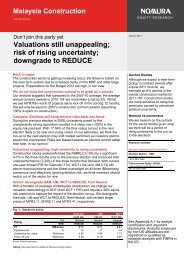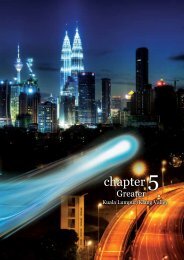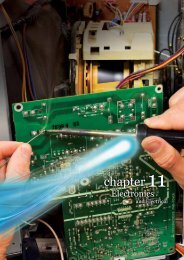Download PDF - ETP - Pemandu
Download PDF - ETP - Pemandu
Download PDF - ETP - Pemandu
Create successful ePaper yourself
Turn your PDF publications into a flip-book with our unique Google optimized e-Paper software.
From a business growth standpoint, these business opportunities<br />
are catalytic opportunities given by the Government and GLCs<br />
via procurement contracts, non-core asset divestment and or<br />
outsourcing of non-core GLC functions that can increase revenue<br />
or turnover. This will in turn cause the business to expand through<br />
other organic means such as mergers and acquisitions.<br />
Exhibit 13.11<br />
Selection Process for High Performing<br />
Bumiputera SMEs<br />
The selection of the High Performing Bumiputera SMEs will be<br />
done through a stringent programme based on selection criteria<br />
such as:<br />
• Core business should preferably be in one of the 12 NKEAs<br />
• Preferably has a minimum three star and above score rating by<br />
SME Corporation Malaysia (SME Corp)<br />
• Preferably has a favourable Credit Bureau Malaysia rating<br />
(Probability of Default < 20 per cent)<br />
•<br />
Growth Trajectory for HPBS<br />
Revenue/Annual Turnover<br />
1<br />
2<br />
3<br />
1<br />
Organic growth (slow & steady growth)<br />
Broad-based <strong>ETP</strong>-catalysed growth<br />
Catalytic opportunities by Gov, GLCs<br />
• Procurement contracts<br />
• Divestment<br />
• Outsourcing<br />
Profitable in the last two to five years<br />
2<br />
An independent selection panel comprising representatives from<br />
Ministry of Finance (MoF), Ministry of International Trade and<br />
Industry (MITI), SME Corp, Khazanah and industry experts will be<br />
evaluating the proposals and conduct background assessment<br />
of the companies. The selection panel will be chaired by TERAJU.<br />
The target is to identify top 100 medium and 1,000 small/micro<br />
Bumiputera SMEs to join the TERAS programme.<br />
4<br />
5<br />
6<br />
7<br />
3 4<br />
Facilitation of new market entrance<br />
• Diversifying revenue stream,<br />
esp. via exports<br />
• Reduce dependency on govt<br />
Merger & acquisition<br />
Funding for new technology<br />
/expansion<br />
No intervention<br />
5<br />
6<br />
7<br />
Year<br />
Exhibit 13.12<br />
To ensure transparency and integrity of the selection process, an<br />
independent audit firm will be appointed to monitor the overall<br />
selection process. To ensure that these SMEs are eventually able<br />
to be independent, clear exit criteria have been identified. These<br />
companies will also have to meet key milestones to enable them<br />
to ‘graduate’ and become large companies within five years, failing<br />
which the companies will be dropped out of TERAS.<br />
Moving Forward<br />
SrI: Narrowing Disparity<br />
Identifying top 100 medium and 1,000 small/micro<br />
Bumiputera SMEs for the TERAS programme<br />
BUMI 100<br />
• Top 100<br />
medium<br />
Bumi SMEs<br />
(approx. top<br />
5 %)<br />
11,136<br />
High Performing<br />
Bumi SMEs<br />
Top 5% of the high performing<br />
Bumi SMEs to achieve 20% GDP<br />
contribution by 2020<br />
BUMI 1000<br />
• Top 1000<br />
small/micro<br />
Bumi SMEs<br />
(approx. top<br />
0.5 %)<br />
In the BTEP Roadmap, the prime objective is to enhance<br />
Bumiputera wealth creation through three key drivers:<br />
1. Building up Bumiputera capabilities through better<br />
employment;<br />
2. Enhancing value of Bumiputera-owned assets such as<br />
financial assets (unit trusts, zakat), property (waqaf land) and<br />
corporate equity and;<br />
3. Increasing Bumiputera corporate ownership and control.<br />
Within each driver described above, specific and detailed<br />
initiatives are already in place. Initiatives set to be implemented<br />
in 2012 are:<br />
• The High Performing Bumiputera Companies (TERAS)<br />
- 30 SMEs have been selected to undergo the TERAS<br />
Programme. These 30 companies have combined revenue<br />
of more than RM900 million, providing jobs to 3,000 people<br />
- 170 companies are currently being evaluated by the<br />
independent selection panel<br />
227








